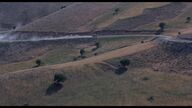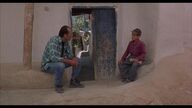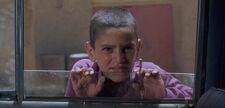Yesterday afternoon, after watching Abbas’ films "The Taste of Cherry" and "Gone with the Wind", I felt more and more jailed. I don’t know if it’s because of his two later films. The more it looks like a genre film, in short, it feels a bit uncharacteristic in the well-behaved, and the more boring it seems to be repeated. I seem to be driving along the steep road with his jeep on the yellow sand. There is no strong plot. I just tell us indifferently what the owner is just doing. We don't know anything about his final ending and his past. Is he recording? Record a sign of survival, or a desolation mottled with light and shadow? have no idea.
Therefore, I suddenly felt that this kind of film is worth chewing. Because when it leaves a very vague impression in your mind, you will try to think about it, to reminisce about it, until you feel that you understand it. The plots of these two films are very light, especially the latter. A group of engineers went to a small village on a cliff. The camera only focused on an engineer wearing glasses, and the rest did not appear. Through his perspective, It showed the life of the villagers, and I still didn't understand it until the end, and I was a bit congratulated that it was finally over. I can't bear that engineer drove to the highest point of this village in order to answer the phone. Abbas is so boring. Why should he drive him for a long time and let us eat a lot of dust? I think he must have ulterior motives, but at least, I have seen the helplessness and impermanence of life, and tasted the taste of it. Although it is very light, I vaguely feel its existence. The fate and sigh of life in the film "The Taste of Cherry" is much stronger. What moved me was that the last male protagonist lay in the dug tomb and looked up at the night sky. It was dark, the thunder kept shining, and we saw the hero's eyes slowly closed. Finally, when the darkness completely engulfed the screen, the sound of rain splashed into our ears. Abbas did not intend to tell us the ending, his mission was completed. He let the middle-aged man drive around for a day, and found three people to help him take care of the funeral (the next day he went to this cave and buried him). These three people are: soldiers in the army, students from the seminary, and museum specimen makers. I haven't thought about why the director put these three people in, but it definitely makes sense, especially the old man in the museum. The words persuading the protagonist not to commit suicide touched me. The old man once planned to hang himself, but he tasted a cherry when he climbed to the cherry tree to hang a rope, and it tasted very good. At this time the sun rose, and a group of school children came and asked him to help shake off the cherries. So the old man dispelled the suicidal thoughts, he said that changing his thoughts would re-understand life. What is annoying is that the middle-aged man still insisted on committing suicide, and even returned to the place where the old man went to work to explain the aftermath.
"The Taste of Cherry" is said to have won many awards, but compared to other Abbas movies I watched a few days ago, I still like those movies because of the documentary style and unabashed innocence... Now let’s review his. A few videos.
A few days ago, I watched several short films directed by Abbas and "Ten", "Close-up", "Passenger", and then watched his "Life and Growth" and "Where is My Friend's House". It is very clear I remember that the prostitute in "Ten" said to the heroine: "You are a wholesaler, and we are a retailer." It is really dumbfounding. In a sense, this film already has a new female consciousness. The protagonist divorced her husband, but the son did not want to be close to her. Her heart was full of guilt, but the son was too young to understand herself. At the end of the film, we saw the crux of her divorce, because she wanted to live a life of her own, she didn't want to be tired of housework, and she didn't want to be a solemn housewife. These ten clips are stitched together in a countdown way. The clever thing is that all the cameras are done in the car. I guess that before the filming started, the director installed a sneak shot camera on the car, and then told them when the film was finished. Subject.
Most of these ten fragments are the conversations between the heroine and the son, and the bearers (among them Muslims, broken-hearted persons, prostitutes, relatives, etc.). There is no complete story structure, just conversations. In the conversation, it is found that the story finds the characters. The emotional world. The sad woman who shaved her hair because of a relationship problem, under the persuasion of the heroine, in order to let her head "breath", she bravely and confidently took off the headscarf, and the personality of the character suddenly appeared.
And watching that "Close-up" is more like a documentary, describing how a worker who pretended to be a famous director on the bus entered another person's home to defraud his trust, and was finally found out and sued to court. This is a tragic story. From the beginning of the investigation, a long interview and a description of the course of events in the trial court, to the end when the plaintiff realized the defendant's hard life and agreed to withdraw the lawsuit, the director made the ending warm. The fake director was finally released from the detention center and met with the real director. The two bought pots of pink flowers on the side of the road to apologize. The whole film spreads the perspective from the trial court. The cold atmosphere, hard facts and lengthy explanations can almost make people doze off. However, in the end, the director extended his tentacles to the society, which is not only It's just a fraud case. We found that the root cause of people's crime and enmity comes from society and the government. In the film, the two sons of the plaintiff both graduated with engineering majors, but could not find a suitable job, and the defendant was also an unemployed worker. Because of the poor life, his wife did not want to live in such a poor life and left him. But he loves movies, but he can't raise funds, and finally he can't extricate himself from the pleasure of pretending to be a director. Thought-provoking.
"Passenger" is a black and white film that tells the story of a boy who went from the countryside to the big city to watch a football match. From the beginning, he worked so hard to "prepare" funds, buy scalper tickets, and then easily miss the game after he slept. . This shows that the director always pays attention to the procedural nature of the story, and has never thought of giving the audience a clear result. His films always stop abruptly when they bring everyone's expectations. The movie is over even before the tears are wiped dry.
"Where is My Friend's House" also tells the story of a little boy who took the wrong homework book. In order to prevent his friend from being scolded by the teacher the next day, he rushed to another village overnight and walked a lot. Road to find a friend's home. The next day, the homework he had done for his friend was handed over to the friend. The teacher finished the homework and found a squashed flower in the book. It was the last ending that touched me. Otherwise, I think this film is at best using the lens to explain the alleys and lights that turn around.
"Birth and Growth" is a continuation of "Where is My Friend's Home", and it is also like a documentary. Describes that the director took his son to visit small towns and villages after the disaster, along the way to find out the whereabouts of the little actors who used to be in "Where is My Friend's House". At the end of the film, the car is driven hard on the extremely steep uphill road, backed down due to lack of horsepower, and then drove up again, like a boulder pushed by Sisyphus, constantly rising, falling, rising, and falling. But all the audience saw hope.
"Children" and "Lu" appear most often in works directed by Abbas. This is a director who is full of imagination like a child, and there is always an endless road under his feet. What his movies are always looking for, like the child who returned the workbook, or the woman who divorced to find freedom—she was also looking for something for others—or, like Kerouac, always "on the way". But it is undeniable that many of his short films have provided a lot of material for his later works. At the same time, he is a director who is good at accumulation.
The road he stays in the film symbolizes life. It is long, bumpy, rugged and steep. We seem to have experienced a lot in his film, but we are walking without stopping. Yes, we are constantly on the move. Then let the sun shine on the head...
January 22
View more about The Wind Will Carry Us reviews







